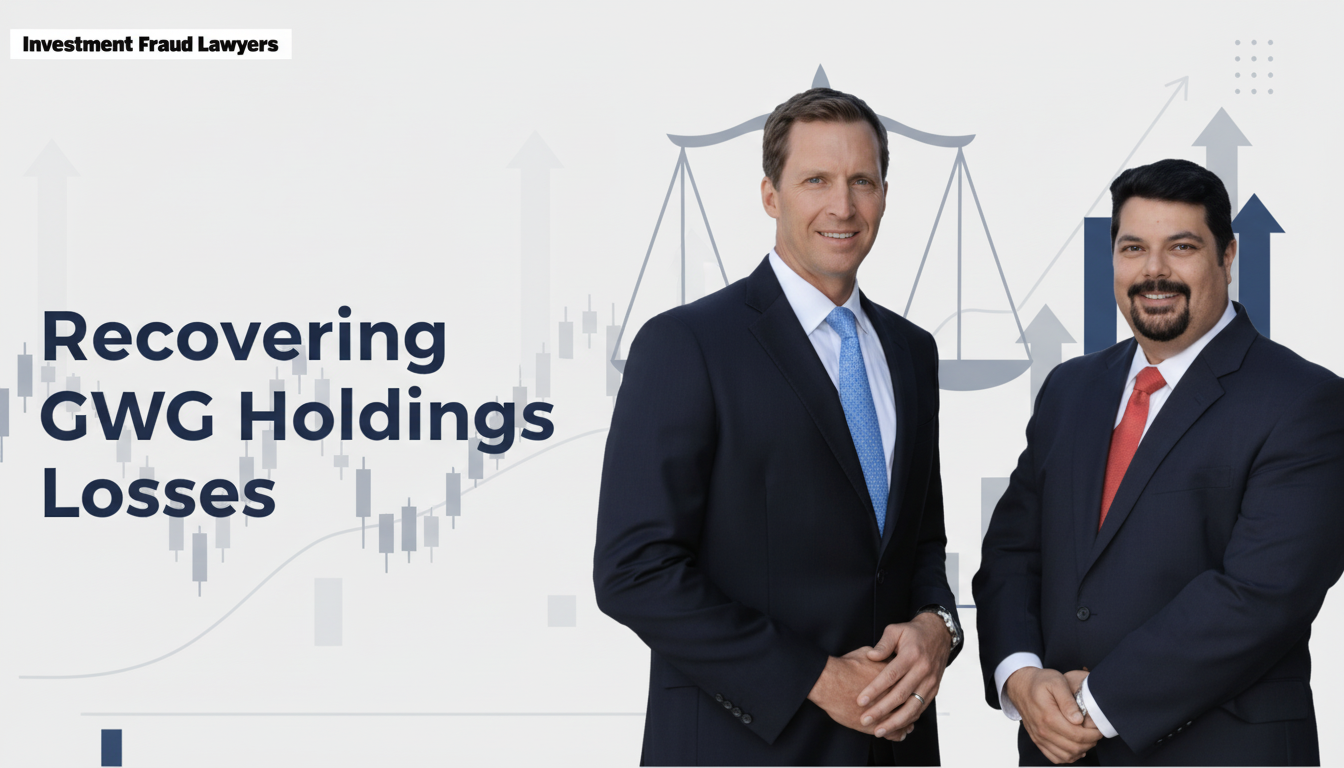GWG Holdings, Inc. issued high-yield “L Bonds” marketed to income-seeking investors as asset-backed instruments tied largely to life insurance policies and other illiquid assets. Beginning in 2021, GWG experienced mounting financial strain, including delayed SEC filings and liquidity issues. In April 2022, GWG filed for Chapter 11 bankruptcy, and trading in L Bonds was halted. Many investors subsequently faced substantial losses, account illiquidity, and uncertainty regarding recoveries through the bankruptcy process alone.
While bankruptcy proceedings may yield some distributions over time, these recoveries are often partial and delayed. As a result, many investors have pursued parallel avenues to seek compensation—particularly through claims against the brokerage firms and financial advisors that recommended and sold GWG L Bonds.
Why Investors Are Pursuing Claims Against Brokerage Firms
Investor claims commonly focus on whether brokerage firms complied with their obligations when recommending GWG L Bonds, including:
- Suitability: Whether the L Bonds were appropriate for the investor’s risk tolerance, investment objectives, liquidity needs, and financial profile.
- Supervision: Whether the firm adequately supervised its advisors, marketing materials, and concentration levels in speculative or illiquid products.
- Due Diligence: Whether the firm conducted reasonable diligence into GWG’s financial condition, business model, and risks prior to recommending the bonds.
- Misrepresentation/Omissions: Whether risks such as illiquidity, credit risk, bankruptcy risk, and GWG’s dependency on new capital were clearly disclosed.
If a firm failed in these duties, investors may have grounds to pursue recovery through FINRA arbitration or other legal avenues.
Haselkorn & Thibaut’s Role and Track Record
Haselkorn & Thibaut (InvestmentFraudLawyers.com) is a national investment fraud law firm focused on investor and securities arbitration. According to the firm:
- Over $5 million in awards and recoveries for clients in GWG and similar alternative investment cases.
- Representation of over 250 clients connected to GWG and comparable matters.
- 98% overall success rate, more than 100 years of combined legal experience on the team, and offices serving clients nationwide with in-person or virtual meetings.
The firm is led by partners Jason Haselkorn and Matthew Thibaut—both former defense counsel for major financial institutions—bringing experience from “both sides of the table,” including prior roles inside the financial services industry.
Their work typically includes:
- Case Evaluation: Assessing account statements, risk profile, concentration, and the specific GWG purchases to determine potential claims.
- Claim Strategy: Legal theories grounded in suitability, supervision, misrepresentation/omissions, due diligence failures, and related FINRA and state law claims.
- FINRA Arbitration: Filing and prosecuting claims—the primary forum for investor–brokerage disputes—often faster than civil court and frequently resolved by award or settlement.
- Negotiation & Settlement: Seeking negotiated resolutions where appropriate.
- Coordination with Bankruptcy Developments: Monitoring the GWG bankruptcy process and integrating any distributions into an overall recovery plan.
Note: Each case is fact-specific. Outcomes vary based on the investor’s circumstances, the recommending firm’s conduct, documentation, and the arbitration panel.
What Types of Losses May Be Recoverable
Potential damages in these cases may include:
- Out-of-pocket losses on GWG L Bond purchases.
- Interest or lost opportunity costs.
- Potential rescissionary damages where appropriate.
- Attorneys’ fees and costs where available by statute or agreement.
Arbitration panels have broad discretion, and damages are determined case by case.
Typical Process for Investors Seeking Recovery
- Initial Consultation: Discuss GWG purchases, timelines, advisor communications, and your goals and constraints at the time of purchase.
- Document Collection: Gather account statements, confirmations, new account forms, risk tolerance questionnaires, emails/notes with your advisor, and offering materials provided to you.
- Case Assessment: Counsel evaluates suitability, concentration, supervision, and disclosure issues; provides a candid assessment of strengths and risks.
- Filing the Claim: If warranted, a Statement of Claim is filed with FINRA; the brokerage firm responds.
- Discovery and Hearing: Parties exchange documents, take testimony, and present evidence before a panel of arbitrators. Many cases settle before the final hearing.
Key Considerations for GWG Investors
- Time Limits: Securities claims may be subject to statutes of limitations and FINRA eligibility rules. Prompt evaluation is important to preserve rights.
- Concentration Risk: Heavy allocations to GWG L Bonds may bolster suitability and supervision claims.
- Illiquidity: If liquidity needs were foreseeable (retirement income, medical expenses, etc.), recommending illiquid products may have been unsuitable.
- Risk Disclosure: Compare what you were told with offering documents and risk factors; gaps may support misrepresentation/omission claims.
Frequently Asked Questions
- Can I pursue recovery if I already filed a bankruptcy claim? Yes. Bankruptcy claims and FINRA arbitration claims against the selling brokerage firm are separate avenues and can proceed in parallel, subject to strategy.
- Do I need to have sold my bonds? Not necessarily. Claims can arise from losses, illiquidity, and unsuitability even if positions remain unsold or frozen.
- What if my advisor has left the firm? Claims typically target the brokerage firm responsible for supervision, not only the individual advisor.
Call to Action
If you purchased GWG L Bonds through a brokerage firm and believe they were mis-sold or unsuitable, you can contact Haselkorn & Thibaut for a free, no-obligation case review:
- Call: 1-888-885-7162
- Website: investmentfraudlawyers.com
- Learn more about the firm: About Haselkorn & Thibaut
Haselkorn & Thibaut reports over $5 million in awards and recoveries for 250+ clients in GWG and similar cases, with a 98% success rate across their practice. Time limits may apply—consider acting promptly to preserve your rights.


